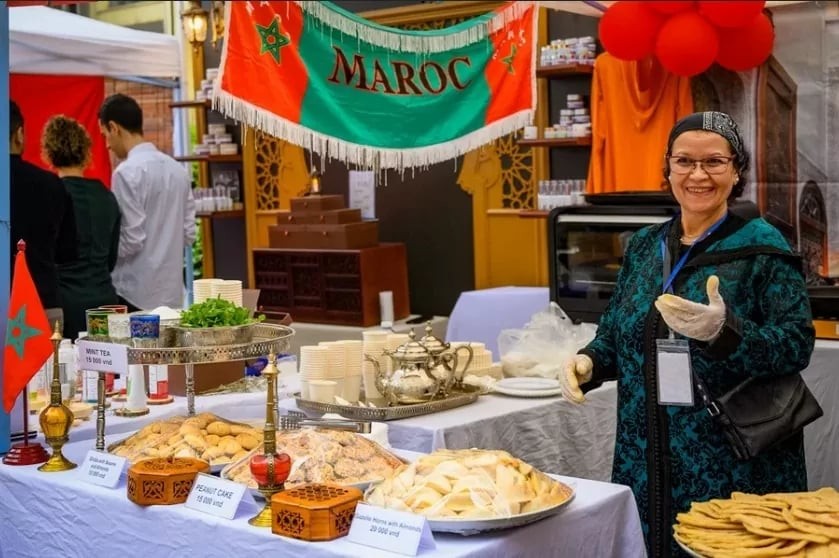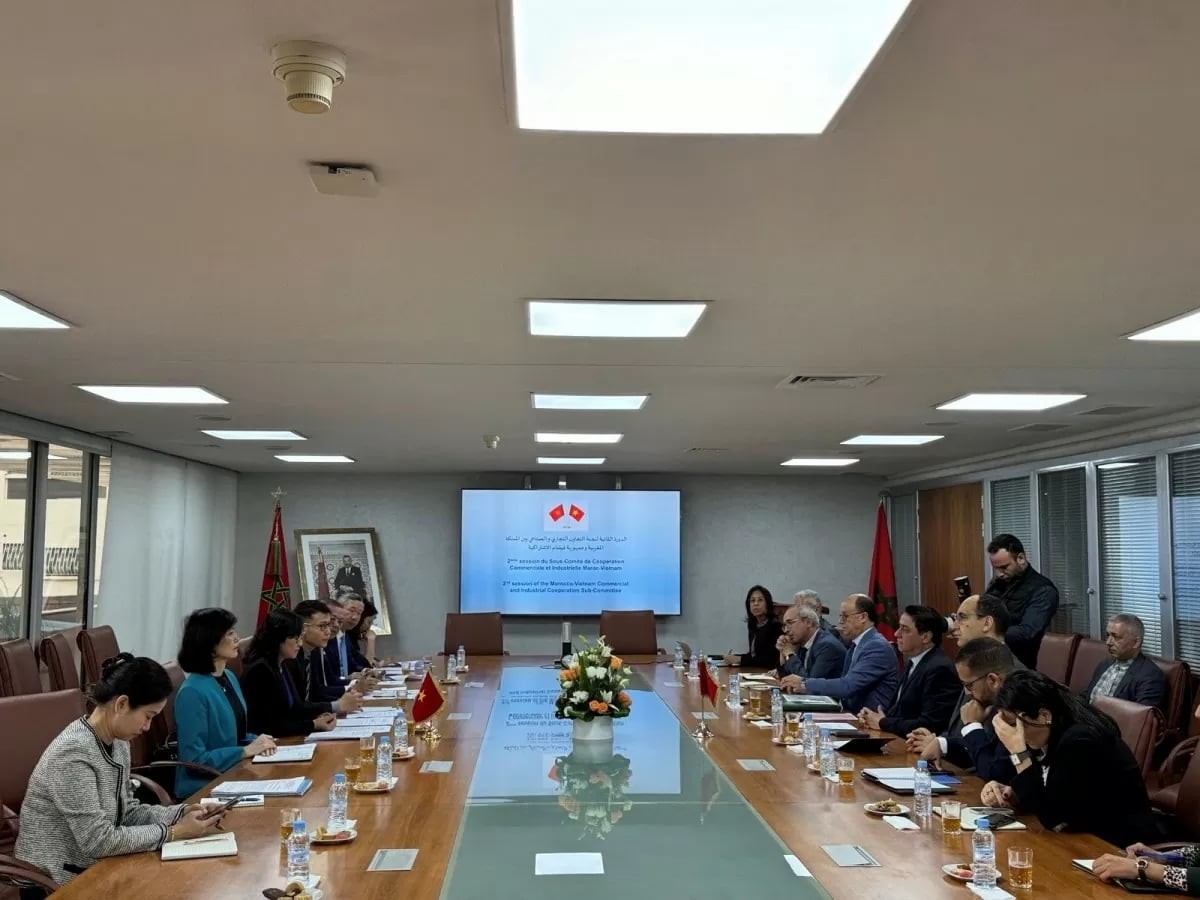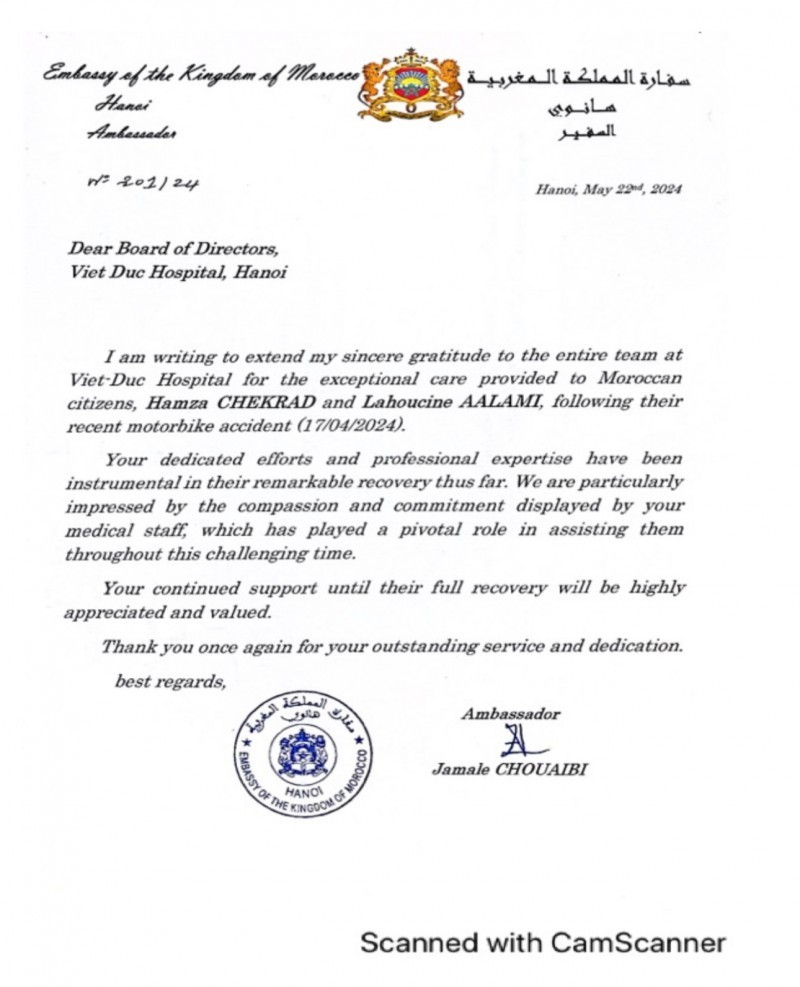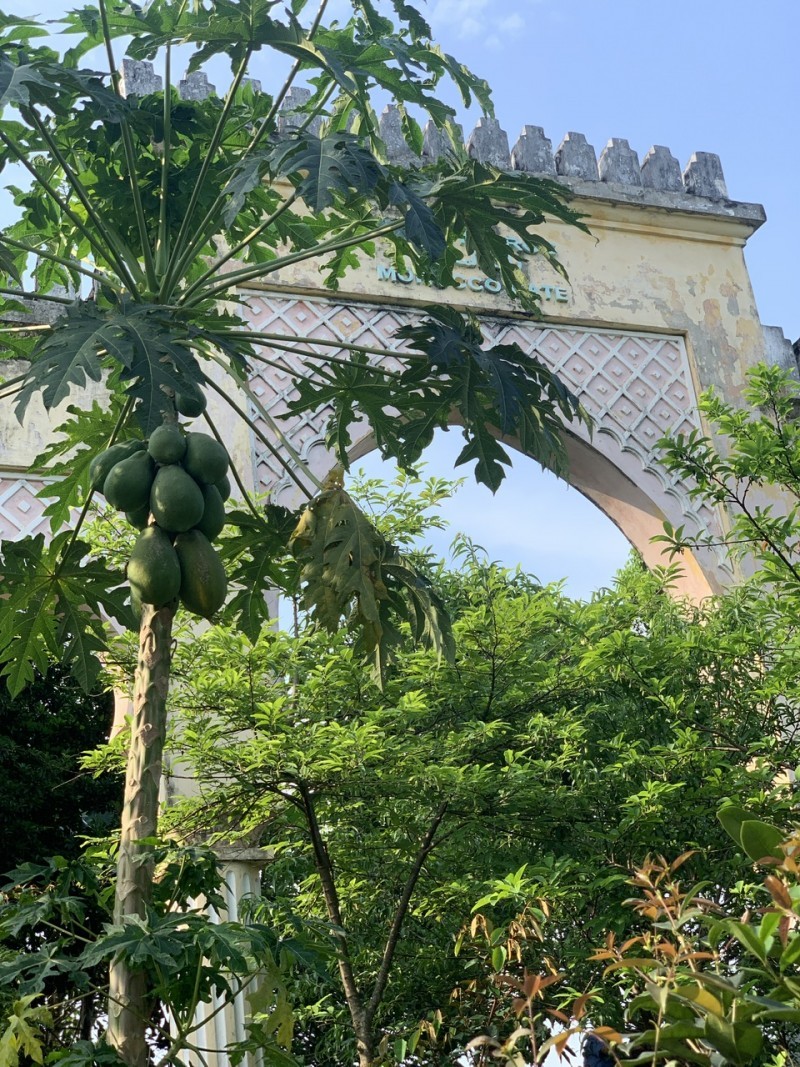Morocco and Vietnam: An Exemplary Relationship For a Shared Destiny
The two sides' historical relationship has been an inspiration for bilateral cooperation. Several joint projects have been signed. Delegations exchanges have also been strengthened to better develop the cooperation potentials between Morocco and Vietnam.
At the governmental level
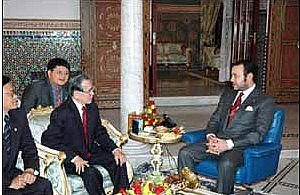 |
We must highlight the official visit to Morocco by Mr. Phan Van Khai, the Vietnamese Prime Minister, during which he was received by His Majesty King Mohamed VI in 2004 and held talks with his Moroccan partner and with the Presidents of the two Chambers of Parliament. Several agreements covering different areas of cooperation were signed on this occasion. During the visit, they decided to establish embassies in both capitals.
The Moroccan Prime Minister, Mr. Abbas El Fassi, paid an official visit to Vietnam on November 24, 2008 leading an important delegation including businessmen. In the course of this visit, Mr. El Fassi was received respectively by the General Secretary of the Communist Party of Vietnam (CPV) Mr. Nong Du Manh and the President of the National Assembly Mr. Nguyen Phu Trong, current General Secretary of the Communist Party of Vietnam.
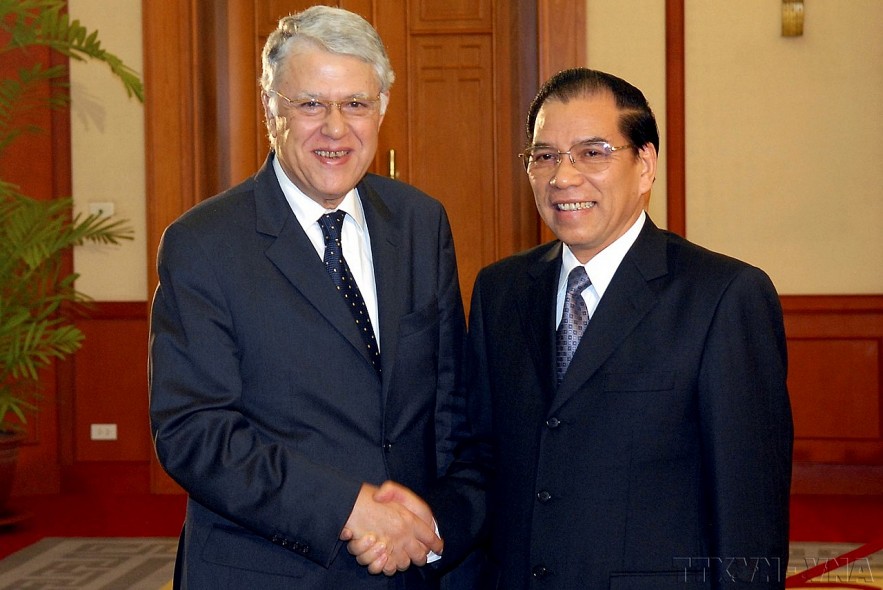 |
| The General Secretary of the Communist Party of Vietnam Nông Duc Manh received the Moroccan Prime Minister Abbas El Fassi during his official visit to Vietnam. |
As for parliamentary cooperation, it has been reinforced through a dense exchange of visits at all levels that allowed the two institutions to share their respective experiences in legislative matters.
We can mention, in this regard:
On the Moroccan side:
- The visit of Mr. Abdelwahed Radi, President of the House of Representatives to Vietnam from 3 to 7 March 2003;
-The visit of Mr. Rachid Talbi Alami and Mr. Mohamed Cheikh Biadillah, respectively President of the House of Representatives and the House of Councilors from March 28 to April 1, 2015, on the occasion of the 132nd Assembly of the Inter-Parliamentary Union in Hanoi;
-The visit of Mr. Habib El Malki, Speaker of the House of Representatives on December 19, 2017.
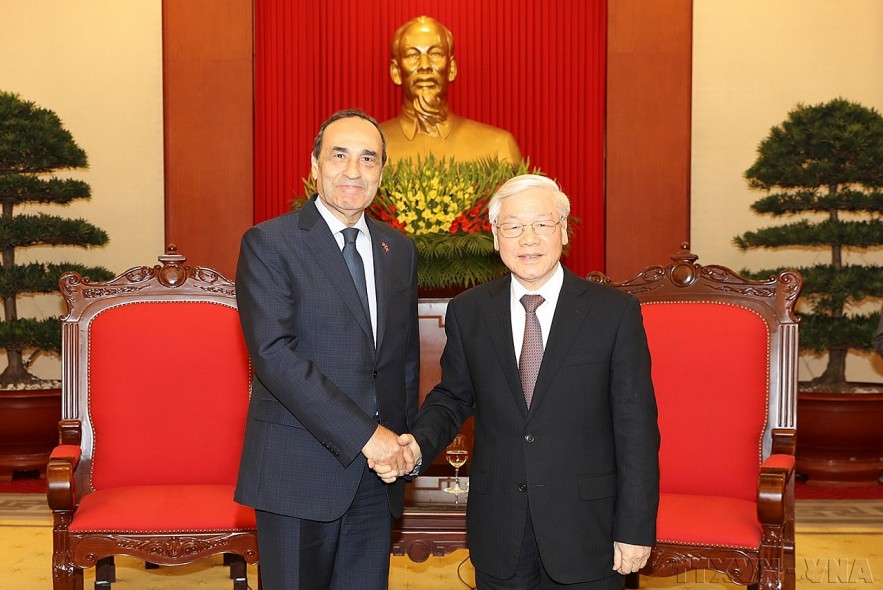 |
| General Secretary of the Communist Party of Vietnam Nguyên Phu Trong received Speaker of the House of Representatives of Morocco Habib El Malki, on an official visit to Vietnam (Hanoi, 19 December 2017). |
On the Vietnamese side:
- The visit of Mr. Nguyen Văn An, President of the National Assembly of Vietnam to Morocco on December 22, 2005, during which he inaugurated the opening of his country's Embassy in Rabat;
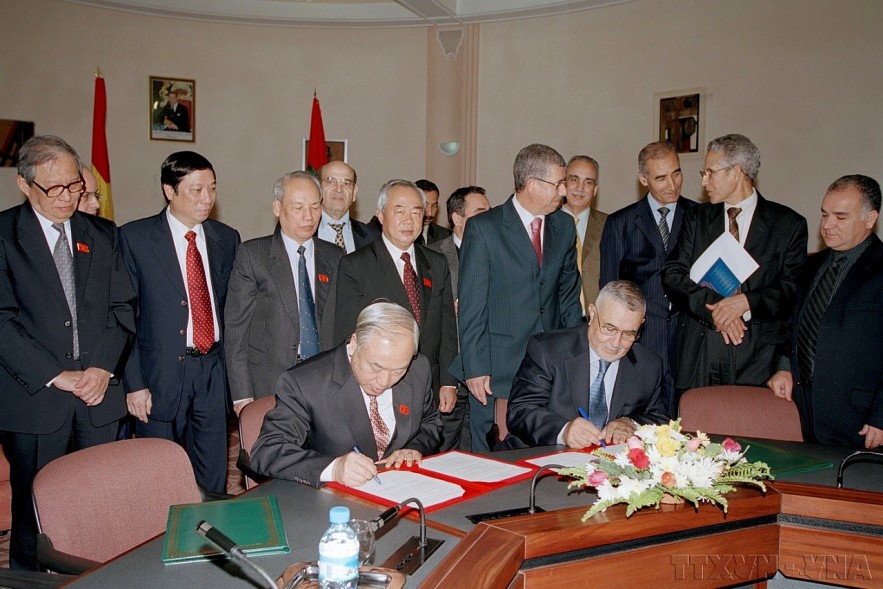 |
| The President of the National Assembly of Vietnam, Nguyen Van An, and the President of the House of Representatives of Morocco, Abdelwahed Radi, signed a cooperation agreement between the two countries. |
- The visit of Ms. Nguyen Thi Kim Ngan, President of the National Assembly of Vietnam, from March 27 to 30, 2019.
- The meeting between Mr. Habib El Malki and his Vietnamese counterpart Mr. Dinh Hue via videoconference on July 7, 2021.
It is also worth recalling the visits of parliamentary delegations, including the chairmen of the Foreign Affairs Committees of both parliaments.
This exchange of high-level visits by government officials and parliamentarians reflects a real political will on both sides to infuse a new dynamic into bilateral relations.
Besides the establishment of a legal framework covering all aspects of bilateral cooperation, the two parties maintain regular fruitful consultations within the joint cooperation committees and political talks between the Ministries of Foreign Affairs. Thus, since the opening of the embassies in Rabat and Hanoi, the two countries have held 4 sessions of the Joint Cooperation Commission and 5 sessions of Political Consultations.
At the economic level
Several trade missions have taken place in both directions. However, despite their significant and rapid progress, the level of trade remains below the economic potential and expectations of both countries.
At the cultural level
The cultural component is developing in a satisfying way. Aside from the training of executives, cooperation between universities and research centers in both countries has been expanded. For several years, several Vietnamese students have been studying in various higher education institutions in Morocco.
Morocco and Vietnam also maintain very close cooperation at the multilateral level. The two countries support each other in the various UN bodies.
Both nations are members of the Francophonie Organization and the Non-Aligned Movement. They share the same values and principles that guide their foreign policy, including peace, tolerance, conflict resolution through dialogue, non-interference in the internal affairs of other states and multilateralism.
Morocco joined the Association of Southeast Asian Nations (ASEAN) Treaty of Friendship and Cooperation in July 2016, which includes ten countries in the sub-region, including Vietnam.
Morocco's engagement with ASEAN is part of His Majesty King Mohammed VI's vision to diversify the country's partners and promote South-South cooperation and the values of peace and tolerance.
The enhancement of the shared historical memory:
In this chapter, the two countries have set a new milestone in building their relations by initiating a fruitful cooperation in the field of shared historical memory. This project initiated, just after the opening of the embassies in Rabat and Hanoi, by the High Commission for Former Members of the Resistance Movement and the Liberation Army together with the Vietnam Veterans Association, aims to introduce both present and future generations the values of peace, friendship and solidarity carried and shared by the Moroccan and Vietnamese people alike.
When, in the middle of the Indochina War (1946-1954), the French army called upon 2000 Moroccan soldiers out of the 125,000 North Africans requisitioned to reinforce its own troops, it put the latter in a truly unusual dilemma: having to fight against a people that had the same claims for independence as Moroccan, against the same colonizing power!
However, in trying to suppress the revolts of one colony by using the forces of another, the French army was not yet aware of the strength and reach of the newly emerging independence movements among the colonized nations.
This is why between 1947 and 1954, many Moroccans deserted the French army to join the Viet Minh, out of anti-colonial solidarity and refusal to serve a cause that was not their own. This movement was initially motivated by the call issued by the prestigious Moroccan nationalist leader Mohamed Ben Abdelkrim EL Khattabi, at the request of President Ho Chi Minh, published in the Egyptian newspaper "Sawt al Oumma" on March 21, 1948 and widely distributed by the Vietnamese. After that, the Moroccan Communist Party (M.C.P.) sent Mohamed Ben Omar LAHRECH, nicknamed Anh Ma - in Vietnamese - to supervise the Moroccan community, especially in the province of Son Tay, about 80 km north of Hanoi, and who greatly contributed to the call for Moroccan soldiers to join the Viet Minh to fight the French colonizer.
The withdrawal of Moroccan soldiers from the French Expeditionary Corps in the Indochina War was further intensified when the brave Moroccan soldiers learned of the deportation by the French government at the time of their legitimate sovereign HM King Mohammed V in 1953.
However, what a curious destiny for these Moroccans, to see themselves tossed about by the ups and downs of French colonial history in Asia... These enlisted Moroccans, whose courage and determination can only be praised even though they found themselves caught between a rock and a hard place, on the other side of the world, in a country whose language, culture and traditions were unknown to them.
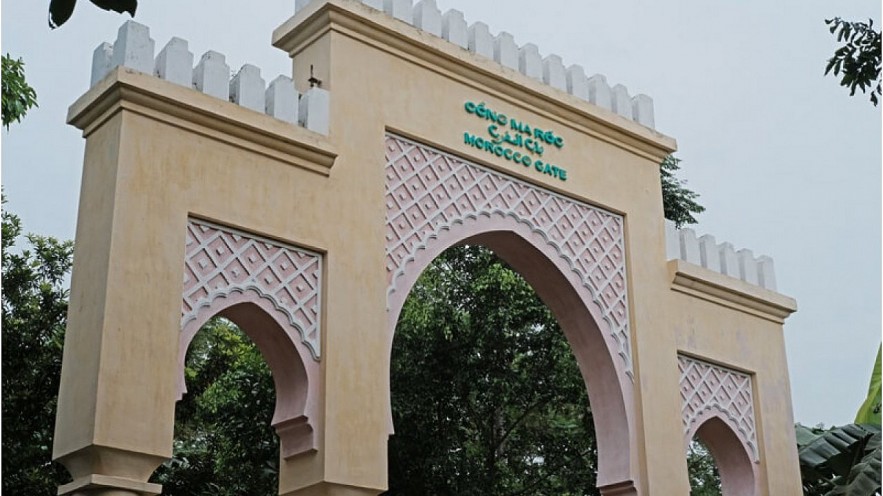 |
| The Moroccan Gate in Hanoi |
The construction of the Moroccan gate in Ba Vi, at the entrance of a dairy cow breeding cooperative, with the support of PRESIDENT HO CHI MINH, constitutes, in this respect, a beautiful testimony and a remarkable symbol of the solidarity between Moroccan and Vietnamese soldiers during the Indochina war. This gate, rediscovered just after the opening of the Moroccan Embassy in Hanoi, after two decades of neglect, was able to withstand the difficult weather conditions of the Asian climate.
Like the gate of Morocco in Hanoi, the Embassy of VIETNAM in Rabat has just initiated a project of stele in the shape of "Gate of Vietnam" in Morocco, inspired by the traditional gate style of the villages of VIETNAM, thus meeting the expectations of the families of Douar Sfari in Sidi Yahya El Gharb in the Province of Kenitra, resulting from mixed Moroccan-Vietnamese marriages, which were perfectly successful.
There is also reason for pride in resolving the sensitive issue of foreign citizenship recognition for the descendants of Moroccan soldiers who participated in the Indochina War and who settled in Vietnam after the end of hostilities and could not be repatriated to Morocco in 1972. After several years of hope and frustration, our compatriots were able to obtain their full Moroccan citizenship in 2015, thanks to the combined efforts of the Embassy of the KINGDOM OF MOROCCO in Hanoi, the Ministry of Justice and the National Council for Human Rights.
With this noble mission to safeguard and enhance this shared historical memory, the High Commission for Former Members of the Resistance Movement and the Liberation Army has resolutely embarked on a project to restore this shared intangible capital. This important project has been supported since 2006 by the Vietnam Veterans Association and the High Commission for Former Members of the Resistance Movement and the Liberation Army of the Kingdom of Morocco, by initiating working visits and signing cooperation and partnership agreements.
In this regard, on December 7, 2006, on the sidelines of the International Veterans Conference in Kuala Lumpur (Malaysia), the President of the Vietnam Veterans Association Major General Dang Quan-Thuy and the High Commissioner for Former Members of the Resistance Movement and the Liberation Army, Dr. El Mostafa El Ktiri signed a memorandum of cooperation and partnership. This was the first memorandum signed between the two institutions.
In August 2010, in Hanoi, Dr. El Mostafa El Ktiri and Major General Tran Hanh signed a cooperation and friendship agreement. Since then, both parties have continued to strengthen their cooperation relations. The Vietnam Veterans Association has received three times the delegation of the High Commission for Former Members of the Liberation Movement of the Kingdom of Morocco in 2011, 2015, and in 2017 and has made two working visits to Morocco in 2012 and 2016.
Both parties have worked to increase the exchange of delegations, information, experience and expertise, with a view to further consolidate relations between both institutions, at a level of distinction and excellence. In addition, a range of academic, scientific, cultural activities were organized, respectively, from August 3 to 6, 2010 in Hanoi, and in Rabat from August 31 to September 6, 2012, from June 2 to 5, 2013 and from October 19 to 23, 2015 and July 21, 2016, from November 25 to 30, 2016. A working visit of a large Moroccan delegation led by the High Commission for Former Members of the Resistance Movement and the Liberation Army and comprising academics participated in an international seminar on the shared Moroccan-Vietnamese historical memory from 27 to 30 March 2017 in Hanoi and Ho Chi Minh City.
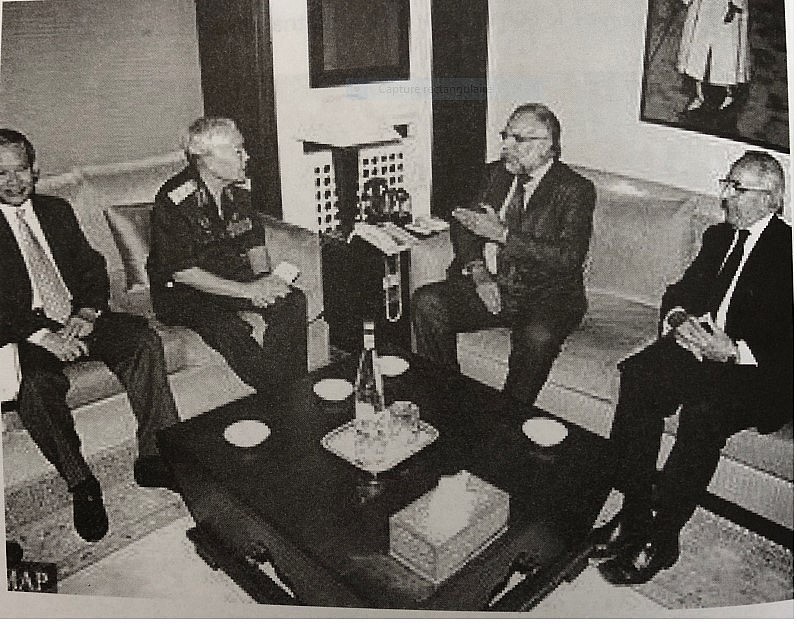 |
| The Minister of State, the late Abdellah Baha receives the delegation of the Vietnam Veterans Association on August 31, 2012 in Rabat |
Therefore, by actively implementing these agreements, it has been possible to achieve the following:
- To raise the level of awareness of the young Vietnamese and Moroccan generations regarding the traditional friendly relations between the two countries, as well as the experiences in preserving and enhancing the historical values of the struggle for liberation and independence of our two respective countries.
- To share information on the events of the 27th and 28th Congress of the International Confederation of Veterans, SCAP Conference.
- To exchange information through the Embassies of our two countries.
- To deliver a number of war-related memorabilia, cultural and historical works related to the struggle for national liberation and the recovery of independence, and works on the birth and development of the two Associations.
- To organize visits to a number of historical sites and tourist attractions on both sides.
- To provide mutual support in international forums to defend their respective national interests, to further enhance the position of both countries and the two Associations, thus contributing to stability, peace and the promotion of cooperative relations between the two countries.
The historical memory between the two countries is also marked by the Vietnamese who left their mark in Morocco. Indeed, Mr. Eric Vo Toàn, an architect of Vietnamese origin, who lived in Morocco and to whom we owe the construction of many famous Moroccan buildings, notably the Mohammed V Mausoleum facing the Hassan Tower, a true emblematic symbol of the city of Rabat, but also more than fifty institutional and religious buildings.
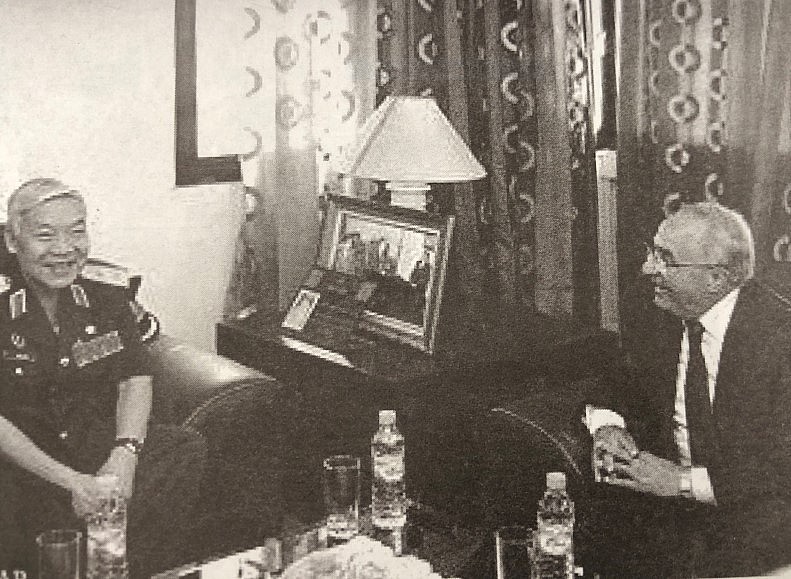 |
| The High Commissioner for Former Members of the Resistance Movement and Liberation Army receives the delegation of Vietnam Veterans in 2012. |
This Moroccan-Vietnamese historical memory serves as a strong "foundation" to promote mutual understanding between the two friendly nations. This common ground of values has been the purpose of a book, entitled "Le Maroc et le Vietnam: regards de l'un sur l'autre", ", published by the High Commission for Former Members of the Resistance and the Liberation Army. This publication is a reflection of the history of Morocco and Vietnam. It contains a summary of analyses prepared by scholars on this period of Moroccan-Vietnamese interaction. The High Commission for Former Members of the Resistance Movement and the Liberation Army intends to republish it soon, to enrich it and enhance its content with the collection of documents that the Vietnamese partner will make available to it.
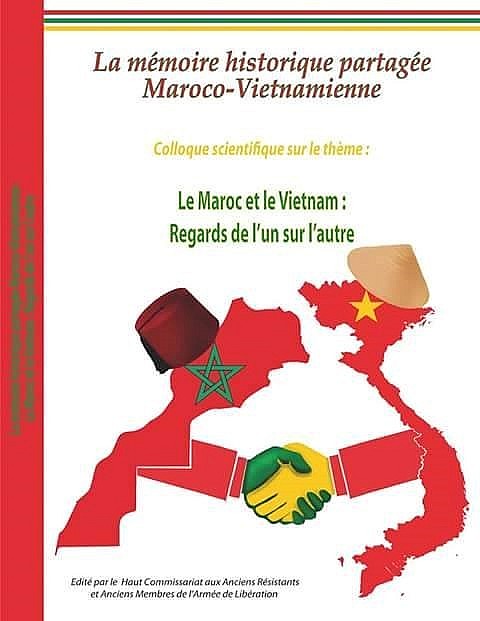 |
| "Le Maroc et le Vietnam : regards de l'un sur l'autre", a book published by the High Commission for Former Members of the Resistance and the Liberation Army |
We can only be delighted to see the establishment of the Association of Friendship Morocco Vietnam in 2017 and the Association of Friendship Vietnam Morocco in 2021, which will work together to maintain and consolidate this very close and historic relationship between our two friendly countries and nations, who share the same human and universal values.
We must enhance this common historical, cultural and social experience to spread and promote it among the next generations, who are passionate about the values of humanism, solidarity, tolerance and dignity, factors that bring people and societies closer together and ensure better Moroccan-Vietnamese cooperation for a brighter future.
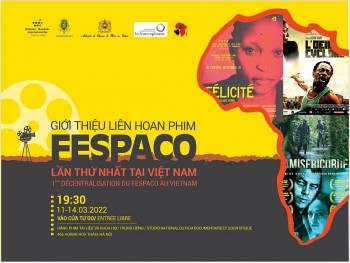 | Pan-African Film and Television Festival of Ouagadougou to Take Place in Vietnam The first FESPACO event in Vietnam will bring to the audience four special feature films |
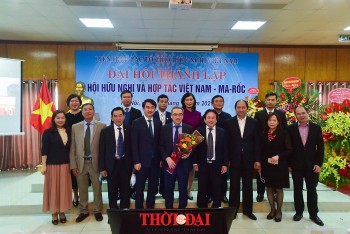 | Vietnam-Morocco Friendship Association Established The Vietnam-Morocco Friendship Association will act as a bridge to promote exchange and cooperation activities in the fields of politics, economy, culture and trade between ... |
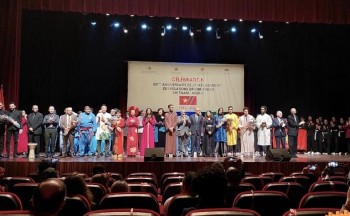 | Vietnam, Morocco Celebrate 60th Anniversary of Diplomatic Ties Vietnam celebrates 60th friendship anniversary with Morocco |
Recommended
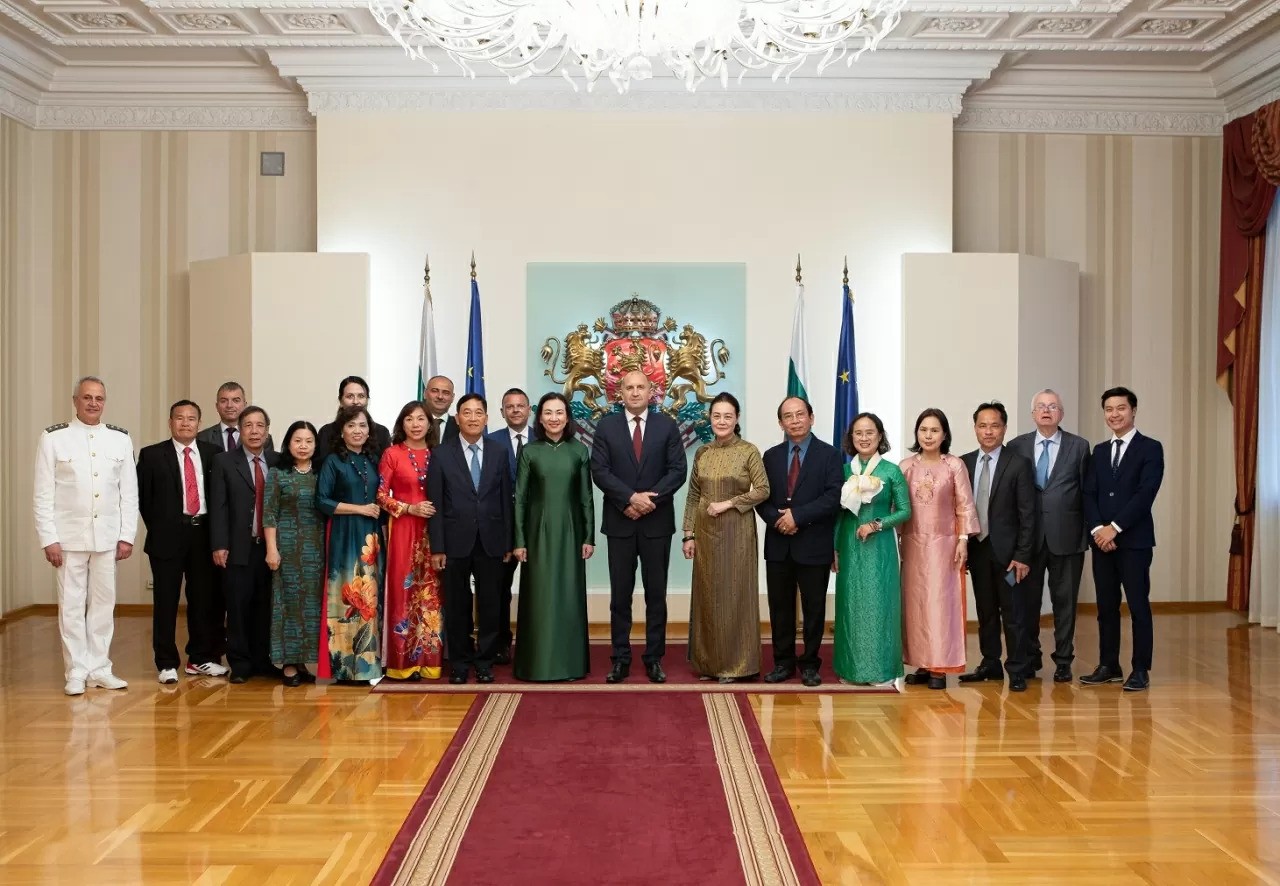 Friendship
Friendship
People-to-People Diplomacy: Sustainable Bridge of Vietnam-Bulgaria Friendship
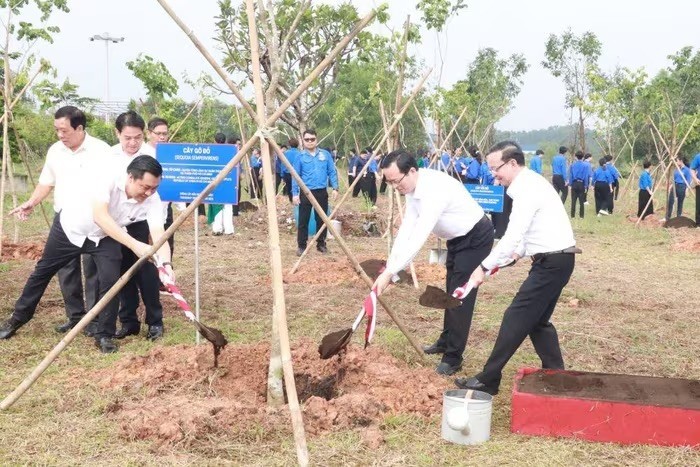 Friendship
Friendship
Binh Duong Hosts Tree Planting to Mark 75 Years of Vietnam-China Diplomatic Ties
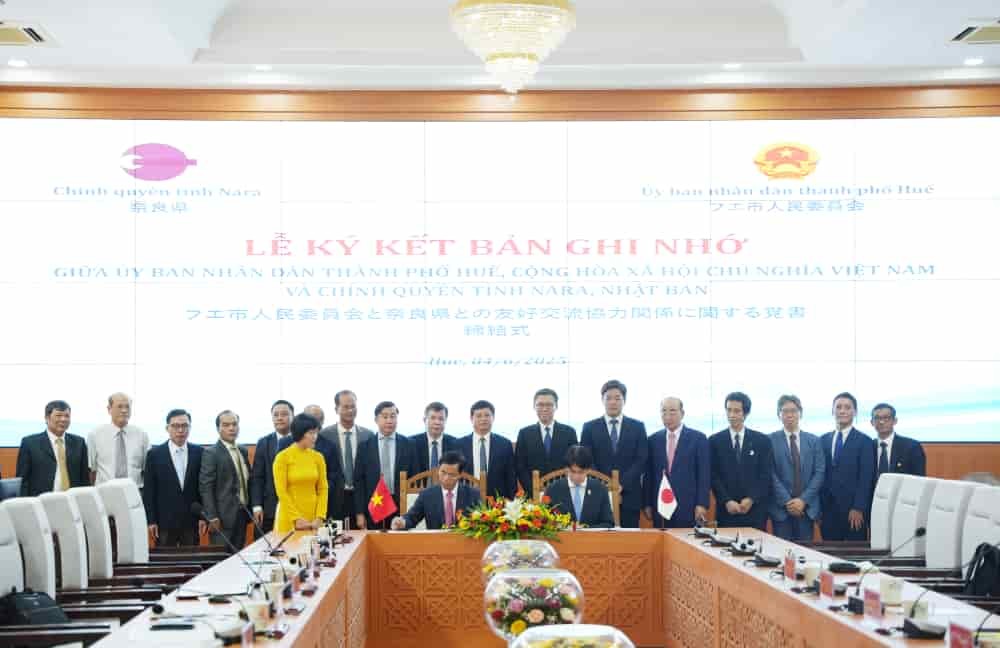 Friendship
Friendship
Hue, Nara Prefecture (Japan) Cooperate to Promote Cultural Heritage Values
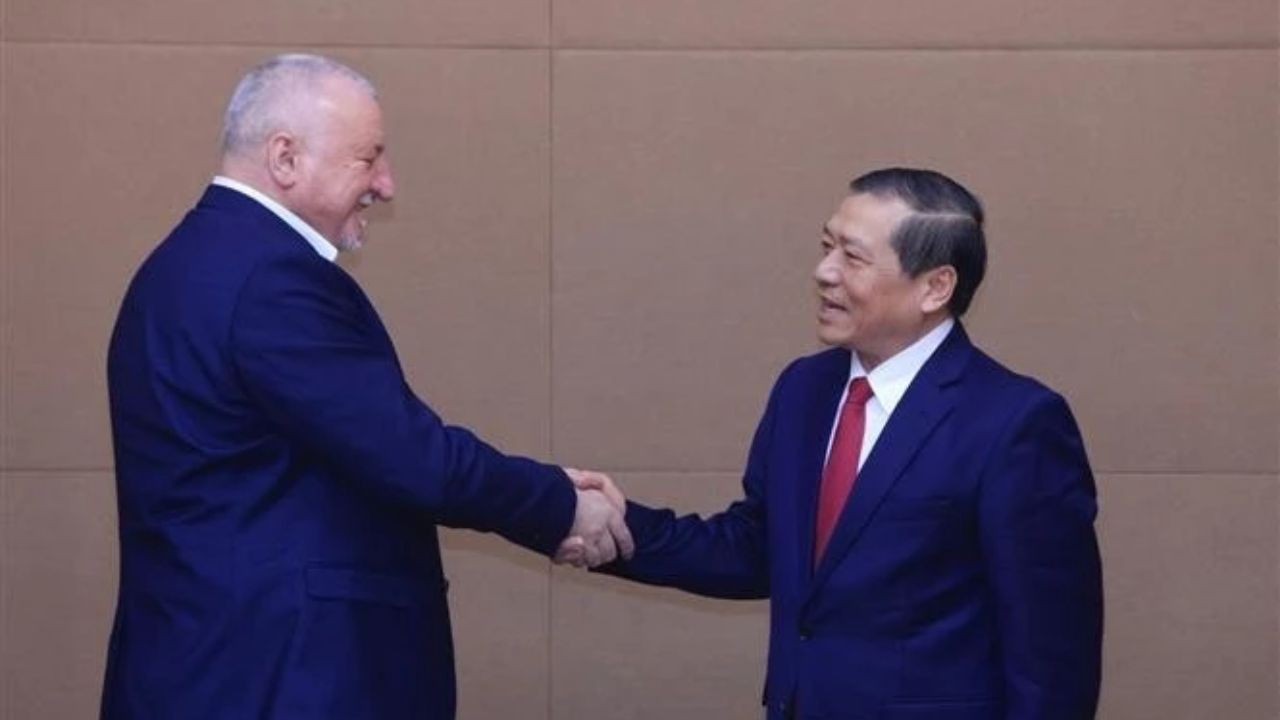 Friendship
Friendship
Strengthening Vietnam-Hungary Friendship
Popular article
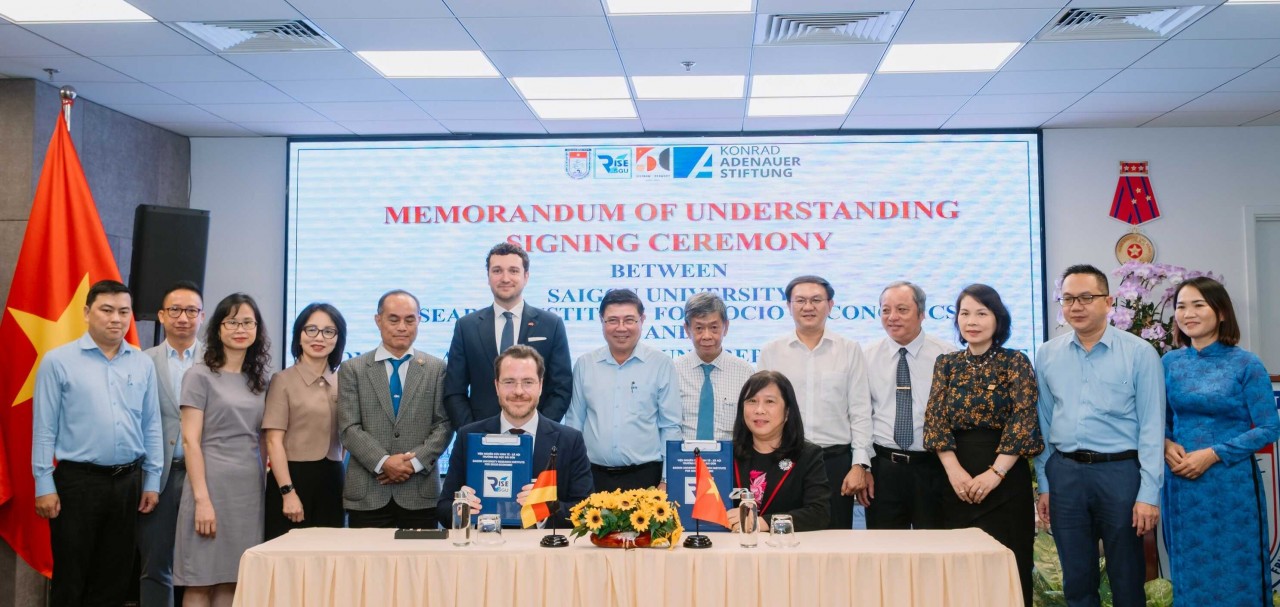 Friendship
Friendship
Another Vietnamese University Partners with Germany’s Konrad Adenauer Stiftung
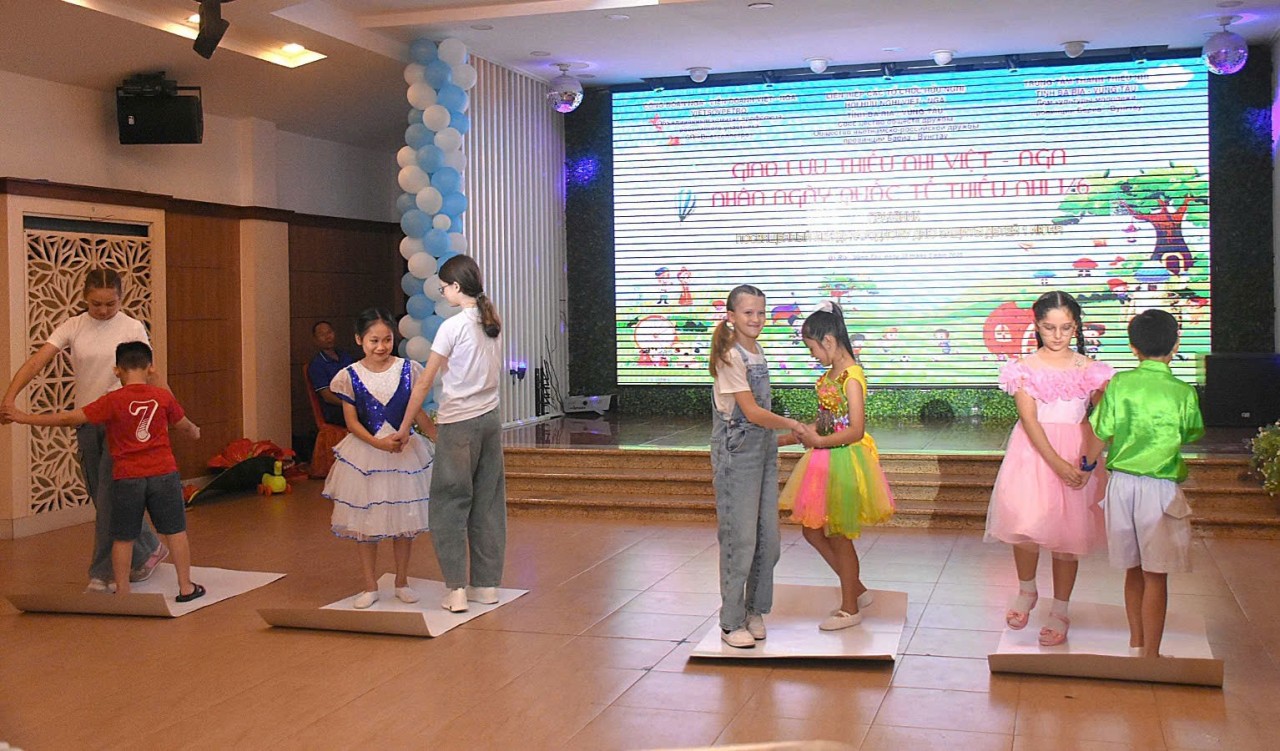 Friendship
Friendship
Over 200 Vietnamese and Russian Children Join “Red Scarf Of Friendship”
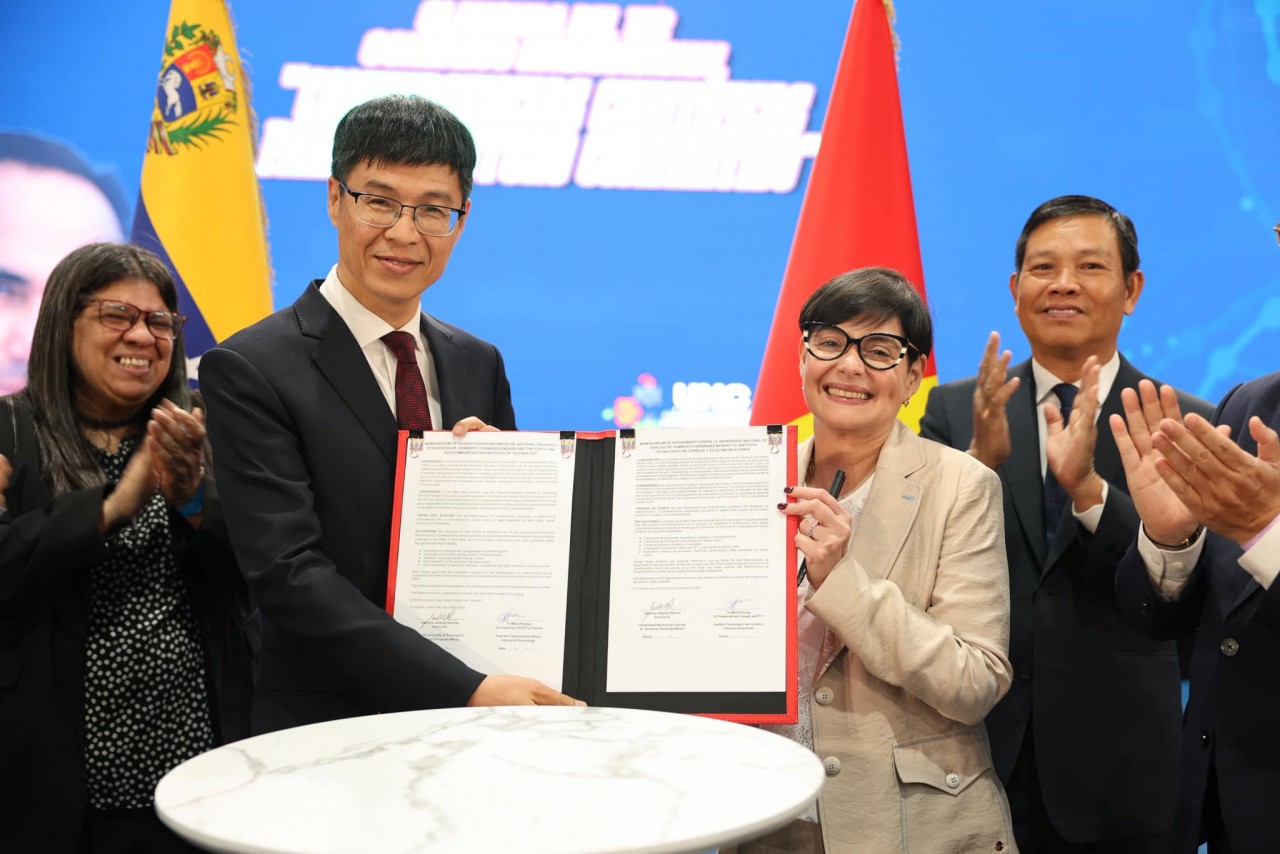 Friendship
Friendship
Venezuela Seeks Vietnam’s Expertise in Science and Technology
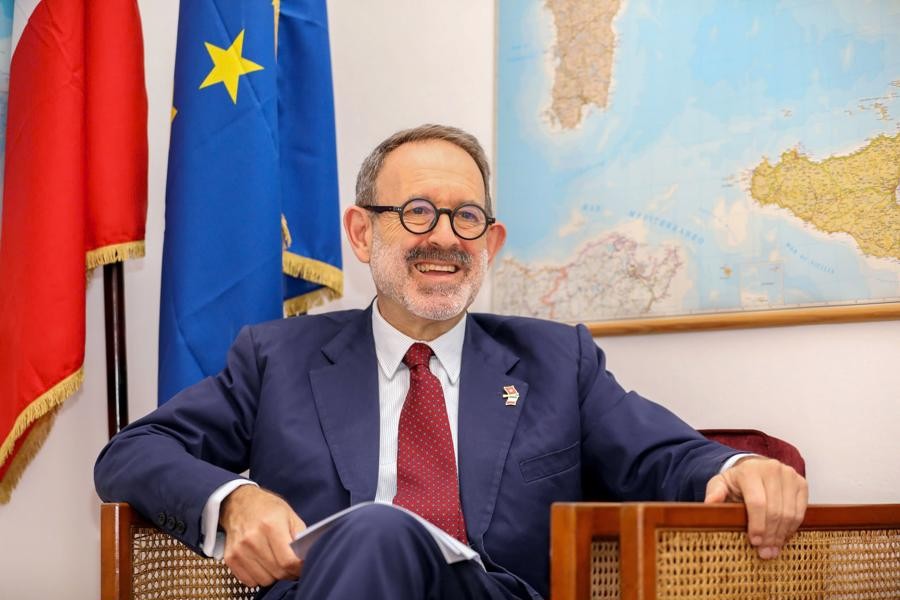 Friendship
Friendship




